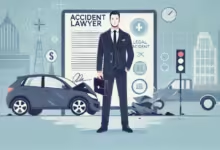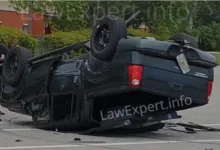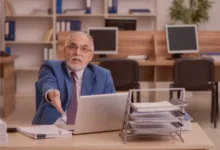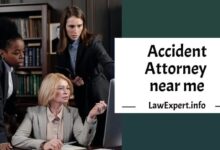What to Do After a Car Accident When It Wasn’t Your Fault. 6 Steps
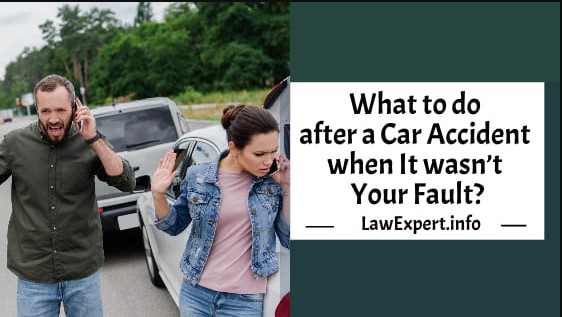
6 Steps What to Do After a Car Accident When It Wasn’t Your Fault. If you’ve been involved in a car accident that wasn’t your fault, there are a few things you’ll need to do in order to protect yourself and your interests. First, it’s important to exchange insurance information with the other driver involved. You’ll also want to take pictures of the damage to both vehicles as well as any visible injuries. And finally, be sure to file a police report so that there is an official record of the accident. By following these steps, you can help ensure that you won’t be held responsible for something that wasn’t your fault.
1. Check for injuries and call 911 if necessary
2. Move your car to the side of the road, if possible
3. Exchange information with the other driver, including insurance information
4. Take photos of the accident scene, if possible
5. Call your insurance company to report the accident
6. Get a copy of the police report, if one was filed
What to do after a Car Accident when It wasn’t Your Fault.

Why proving Fault After a Car Accident is Crucially Important
A car accident can be an incredibly stressful and disorienting experience. It can be hard to figure out what to do in the aftermath of such an event, especially because there are so many factors to consider. One of the most important things you should always focus on is proving fault after a car accident–this is vitally important for ensuring that your rights and interests are protected.
The process of proving fault typically begins with gathering as much evidence from the crash as possible. This includes taking pictures of the damage caused, talking to any witnesses who may have been on the scene, and gathering any relevant information about yourself or other drivers involved. Once you have gathered all of this information, you can start building a case for why one party was at fault.
In some cases, it may be fairly simple to prove who was at fault; however, this isn’t always so clear-cut. For example, if both parties were partially responsible for the accident, then it could become more complicated to figure out who was primarily responsible–and thus liable–for damages resulting from the crash. In these scenarios, it’s best to work with an experienced lawyer who can help you thoroughly assess all available evidence and create a strong argument in your favor.
Proving fault after a car accident is also important for insurance purposes; depending on your coverage level, you may be eligible for compensation from either your own insurance provider or another party’s insurer if their driver was found liable for the accident. This can help cover expenses including medical bills and repairs costs associated with damage from the crash.
It’s always recommended that you take proactive steps to protect yourself in case of an auto accident before it happens–like making sure you have ample liability coverage–but sometimes accidents still occur despite our best efforts. When they do, knowing how to prove fault can save you loads of time and stress in getting back on track after a collision occurs.
Check for injuries and call 911 if necessary
If you or someone else has been injured, it is important to act quickly and check for any injuries that may have occurred. Have the injured person stay still and check for any cuts, bruises, bone fractures, or other wounds. If necessary, call 911 right away to get proper medical attention because delaying can be dangerous. It’s important to always take precautions in case of an emergency; therefore, being prepared ahead of time can make a big difference.
Move your car to the side of the road, if possible
If you are experiencing car trouble, it is always a good idea to move your car off the road if possible. Pulling your car to the side of the road can help prevent accidents and maximize safety for other drivers. Furthermore, if you have car insurance, having your car parked on the side of the road as opposed to being stopped in the middle of traffic could be beneficial because certain insurance companies may not provide coverage while your vehicle is blocking traffic. Always check with your insurance company before proceeding. Additionally, by parking safely on the side of the road you can avoid getting fined or accumulating points on your license.
Exchange information with the other driver, including insurance information
After a car accident, exchanging information with the other driver is an important step in making sure that all parties have the necessary coverage. This includes ensuring that both drivers have their insurance cards readily available to exchange policy numbers and contact information with the other driver. It also means providing identifying information such as license plate numbers and driver’s licenses for drivers who must file a police report. In addition, it is important to document any damage to both cars that occurred during the accident in case of a later dispute. Exchanging this pertinent information with the other driver ensures that all involved are properly protected after the incident has occurred.
Take photos of the accident scene, if possible
Capturing images of the accident scene can prove extremely beneficial should a legal dispute arise. It is always best to take pictures of the area surrounding the accident, as it can provide valuable evidence and context for understanding how and why the event occurred in the first place. Documenting the scene and its location can be key to ensuring that any subsequent litigation is conducted on accurate premises. Taking photos of the accident scene can give all parties involved – including insurance companies, lawyers, and arbiters – an opportunity to review and understand what happened from a variety of perspectives, ultimately allowing them to make fair decisions.
Call your insurance company to report the accident
Contacting your insurance company after an accident is an important step to take. Once you have the information and details of the incident, it’s important to connect with your insurance provider right away. They can provide advice on how to handle the situation and get you started on the process of sorting out any claims or coverage that may be necessary. Don’t wait; calling them soon can help make sure that you’re able to take advantage of all available resources.
Get a copy of the police report, if one was filed
When an incident has been reported to the police and a report was created, it is possible to obtain a copy of the report for your records. In many cases, you can do this in person at the police department or request a copy by mail. Before making the request, be sure to check with the local police department to understand what forms and documents are necessary to receive a copy of the report.
Make sure to ask about any fees associated with obtaining a copy of the report as well as how you can pay for them ahead of time. Requesting and having an official copy of a police report can be invaluable in situations where it must be presented at court hearings or appealed in traffic cases.

If you are involved in a car accident, it is important to take some quick and necessary steps to ensure everyone’s safety and to document the scene. First, check for any injuries and call 911 if necessary. If possible, move your cars to the side of the road so that they are not blocking traffic. Then, exchange information with the other driver, including insurance information.
Be sure to take photos of the accident scene if you can, as this will be helpful later on. Finally, call your insurance company to report the accident and get a copy of the police report if one was filed. By following these simple steps, you can help make sure everything is taken care of in case of an accident.
After being involved in a car accident that was not your fault, it is important to take the necessary steps to ensure all damages are accounted for and justice is served. Move any vehicles away from traffic if possible and contact the police or 911. Exchange information with other drivers or pedestrians involved, take pictures of the incident, and seek medical attention if necessary.
Contact your insurance company as soon as possible while also consulting a lawyer experienced in motor vehicle accidents if your case warrants it. Following these essential steps will help you get through this difficult time and make sure all parties involved are held accountable.
FAQ. What to Do After a Car Accident When It Wasn’t Your Fault
Question 1: Can an accident lawyer help me with my case?
Answer 1: Accident lawyers specialize in helping individuals who have been injured due to the negligence of others. Whether you’ve been involved in a slip and fall, car accident, medical malpractice, or any other type of accident, an experienced lawyer can help guide you through the legal process and provide advice on how best to pursue your claim.
When deciding whether to hire an accident lawyer, it’s important to understand what they bring to the table. An experienced lawyer will be able to review all evidence pertaining to your case and provide insight into relevant laws and statutes which may apply in your situation. They can also offer guidance regarding your rights as an injured party and advise on when it is necessary to seek additional damages.
In addition, an experienced lawyer will take the burden of communication off of you. This includes negotiating with insurance companies and corporations on your behalf, as well as keeping you informed about court proceedings or settlements that need attention. A lawyer can also explain the potential risks associated with pursuing a claim if it does not end favorably for you.
Ultimately, hiring an accident lawyer is always recommended if you are seriously injured in an accident due to another’s negligence. Not only can they help reduce stress by taking care of communications and paperwork related to your case, but they also have intimate knowledge of relevant laws that could potentially make all the difference when asserting your rights as a victim.
Question 2: Who pays for car accident damages if the crash wasn’t your fault?
Answer 2: Nobody wants to be involved in a car crash. And least of all do people want to be deemed at fault and have to take responsibility for any damages caused? But what happens when you’re not at fault, but still have to shoulder the burden of paying for damages and injuries?
When it comes to car accident damages and who is responsible for them, the laws can vary depending on the state you live in. Generally speaking, though, if another driver was responsible for an accident that caused you injury or damage, then their insurance company should pay for those costs.
If the other driver does not have insurance or is underinsured, then your own insurance company may help cover some of your losses, depending on which kind of coverage you bought. If your policy includes Uninsured Motorist/Underinsured Motorist Coverage (UM/UIM) this will help protect you financially by providing monetary compensation up to a certain limit if an uninsured or underinsured motorist causes an accident.
In addition to any insurance money collected from either party’s insurance company, some states allow victims of car accidents that were not their fault to sue the other driver directly and collect damages through a court order or settlement agreement. The amount awarded may include lost wages due to missing work as well as medical expenses incurred after the crash. This option may prove beneficial when there is significant property damage or personal injury that is not adequately covered by insurance companies.
Question 3: How does insurance work when its not your fault?
Answer 3: Do you ever find yourself asking, “How does insurance work when it’s not my fault?” Don’t worry – you’re not alone. Understanding the intricacies of car insurance can be tricky, especially when an accident is caused by someone else’s negligence.
In most cases, your own car insurance will still provide coverage for repairs and other costs incurred from a crash that was not your fault. Your insurer will typically attempt to recover its losses from the at-fault party or their insurance company. The process of filing a claim can be complicated, so make sure you understand exactly what steps are necessary in order to get the compensation you deserve.
The first step is to report the incident to the police and obtain a copy of the police report. This will serve as official documentation that the accident was indeed caused by another driver’s negligence. Next, contact your insurer as soon as possible and fill out any paperwork they require to start your claim process. Depending on your policy, there may be other steps required such as obtaining a rental car while yours is being repaired or filing an additional claim with the at-fault party’s insurance company.
Once all documents have been submitted, it’s just a waiting game until you receive word from your insurer about how much it will cover for repairs or replacements. Depending on the severity of damage to both vehicles and any injuries sustained, this could take several weeks or even months before everything is finalized.
While dealing with an auto accident caused by someone else can be stressful and time-consuming, understanding how insurance works when it’s not your fault can help you navigate through this difficult process more easily – and save you a lot of money in the long run!
Question 4: Are there things you should not do or say after a car crash?
Answer 4: No one wants to be in a car crash. It’s traumatic, and unfortunately sometimes even fatal. But if you do find yourself in the unfortunate circumstance of being involved in a car accident, it’s important to know what you should and should not do to ensure that your rights are properly protected.
The first thing you should not do is leave the scene of the accident before speaking with law enforcement or exchanging information with any other drivers involved. It’s also important that you don’t admit fault or blame anyone else for the accident. Instead, try to provide clear and accurate information about what happened without offering details that may make one side look better than the other. Accusations can come off as confrontational which will likely not serve either party well in the long run.
Be sure to take photos of the damage done to both cars as evidence, but do so while still maintaining respect for other people’s property and allowing them their privacy if they want it–this is not the time for taking selfies! Additionally, be sure to cooperate with law enforcement at all times–try not to argue or become defensive even if something doesn’t feel right–you can always seek legal counsel later down the line if need be.
It might seem obvious but it bears repeating: getting into an argument with another driver will only complicate matters further so no matter how frustrated or upset you may feel after an accident, keep your composure and stay focused on exchanging relevant information like insurance companies and contact info so that claims process can move forward swiftly.
In conclusion, an automobile collision is never an ideal situation for anybody involved but there are certain steps you can take to ensure that things go as smoothly as possible afterward such as avoiding confrontations with other drivers and leaving sufficient evidence behind for insurance purposes including photos taken at the scene of damages done to both vehicles. Lastly, stay calm and collected throughout everything — it won’t change what happened but it may make getting through it easier for both parties.
Question 5: Leaving the scene of an accident not at fault
Answer 5: Accidents are a traumatic experience, and one of the hardest decisions to make is when to stay and when to go. We hear often that if you leave the scene of an accident not at fault, you could be charged with a crime. But what’s the truth behind this?
When we talk about leaving the scene of an accident, whether you were at fault or not, we have to consider the laws and regulations in your region. Every country has its own specific set of rules regarding accident liability and the consequences for leaving the scene of an accident. In general, though, if you find yourself in an accident where you were not at fault – regardless of whether or not there was physical damage – it is best to remain on site until everything is sorted out.
It may be tempting to leave before the police arrive when it’s clear that you are not at fault (especially if there wasn’t any physical damage), but remember that doing so could land you in hot water. If authorities discover later on that it was actually your vehicle involved in the crash then they might press charges against you. Depending on where you live – these can range from fines and points on a license all the way up to jail sentences for more serious cases.
If you were not at fault, yet still decide to leave without exchanging information with other parties involved, then it’s important to notify the police as soon as possible afterward. This way, it will be clear in their records that no wrongdoing occurred and no legal action needs to be taken against you.
Remaining at the scene after an accident is always preferable over leaving – no matter how guilty or innocent either party may feel or by how much fault is shouldered by both sides. The penalties associated with fleeing any kind of collision can have devastating results both financially and criminally depending on the jurisdiction – so please take care if ever driving near another vehicle!
Question 6: What happens if the person at fault in an accident has no insurance?
Answer 6: Getting into a car accident can be a traumatic and expensive experience. As an unfortunate reality, not everyone on the road is insured and accidents are sometimes caused by individuals with no insurance. So, what exactly happens if the person at fault in an accident has no insurance?
In most countries across the world, it’s necessary to have some kind of insurance coverage when you drive a vehicle. That said, there are some exceptions where people may be exempt from having to purchase coverage. However, even if they don’t have to buy policy coverage by law, they still could be held financially responsible for damages resulting from an accident that was their fault.
If you don’t have any insurance but were found to be at fault in an accident, you will likely have to pay for all of the damage done out of your pocket. This can be incredibly expensive and result in major financial hardship for those involved—even if there are no serious injuries or fatalities as a result of the crash.
In certain cases, though, uninsured drivers who cause an accident may still get some protection from legal expenses that may arise due to litigation. For instance, if someone sues you after you cause an accident without insurance in place, you might receive help from special liability umbrella funds which exist in many states or countries. These funds can provide financing for legal fees related to your case and their exact terms vary depending on where you live and how much money is available at any given time.
Overall, it’s always better to make sure that you’re covered by some kind of car insurance policy so that in case anything goes wrong while driving—whether it’s your fault or not—you won’t incur major financial losses due to medical bills or other expenses related to damages caused by the accident itself.
When you're involved in a car accident that wasn't your fault, it's crucial to take the right steps to protect your interests. Here's a list of criteria compiled by car accident lawyer experts to guide you through this process:
Ensure Safety First: Move to a safe area if possible. Check yourself and others for injuries. Call 911 immediately if there are any injuries. - 97%
Call the Police: Regardless of the severity, it's important to have an official police report. It can be critical for insurance claims and potential legal actions. - 100%
Document the Scene: Take photos of the accident scene, including vehicle positions, damages, and any road signs or traffic signals. This visual evidence can be vital. - 99%
Exchange Information: Get the contact and insurance information of the other driver. Avoid discussing fault or details of the accident extensively. - 98%
Gather Witness Information: If there are any witnesses, get their contact information. They could provide valuable testimony later. - 96%
Seek Medical Attention: Even if you feel fine, some injuries manifest later. Getting a medical check-up creates a record of any injuries related to the accident. - 99%
Notify Your Insurance Company: Inform your insurer about the accident as soon as possible. Be factual about the details but refrain from admitting fault. - 97%
Keep Records: Document everything related to the accident – police reports, medical bills, correspondence with insurance companies, and any other related expenses. - 99%
Consult a Car Accident Lawyer: Particularly in accidents where you're not at fault, legal advice can be crucial. An experienced lawyer can guide you on the right course of action, from dealing with insurance companies to filing a claim for damages. - 100%
Avoid Immediate Settlement Offers: Be wary of quick settlement offers from insurance companies. Consult with your lawyer to ensure you're getting a fair deal. - 98%
Follow Legal and Medical Advice: Adhere to the advice of your lawyer and doctor. This ensures your legal rights and health are prioritized. - 99%
Stay Organized: Keep all your accident-related documents and communications organized. This will be helpful in any legal proceedings or insurance claims. - 100%
Be Mindful of Legal Deadlines: Be aware of the statute of limitations for filing a claim in your state. Missing these deadlines can forfeit your right to compensation. - 97%
Use Discretion on Social Media: Avoid discussing your accident or posting related information on social media, as this could be used against you in your claim. - 100%
Consider Long-Term Impacts: When negotiating settlements, consider future medical needs or lost wages related to the accident. - 99%
99%
Score:
Remember, every car accident is unique, so the approach might vary slightly depending on the specifics of your case. Consulting with a car accident lawyer will help ensure that your rights are fully protected.


